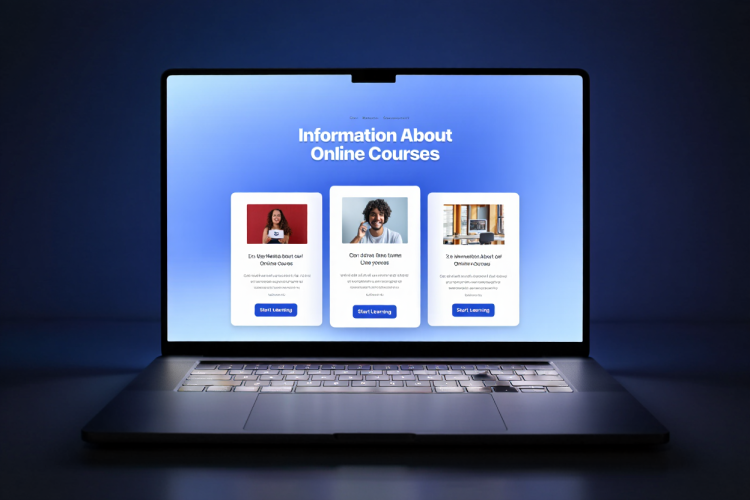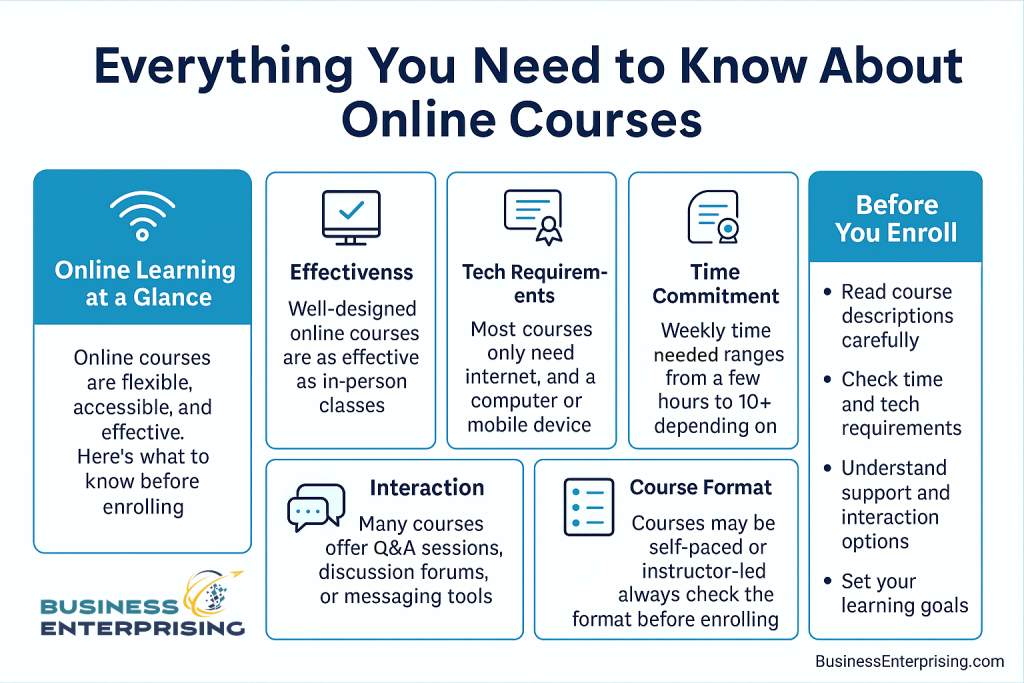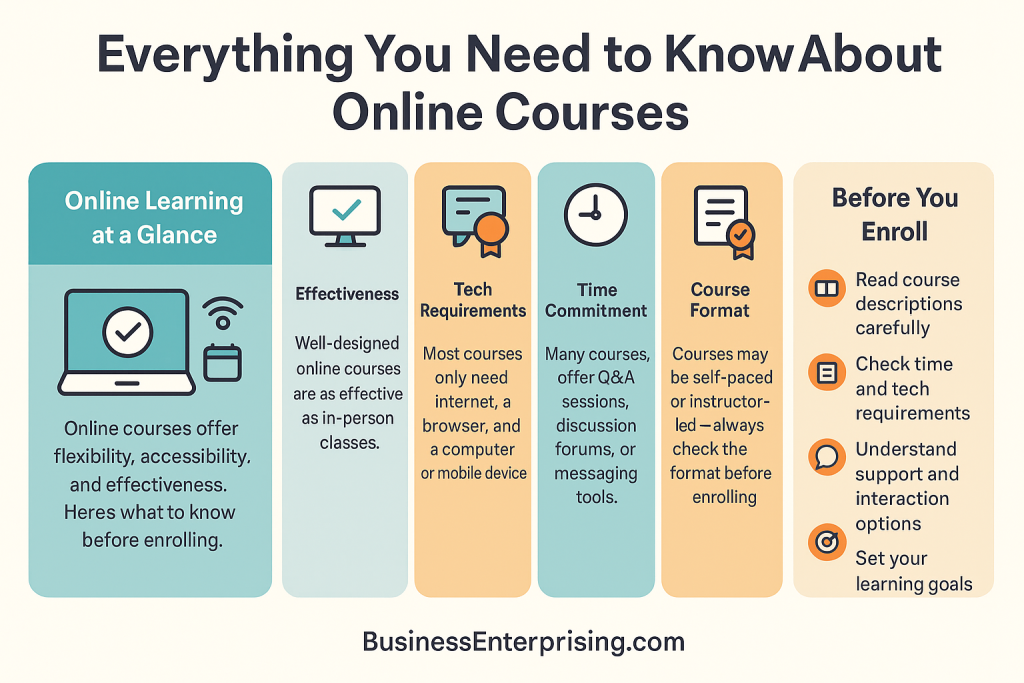
Before enrolling, you’ll want to understand what each course includes. Therefore, it helps to review the platform, the format, and the expected weekly time. Additionally, check if the course provides a certificate or academic credit. This allows you to match your goals with the right course.
You may also wonder about the level of interaction. Some courses include forums or live sessions. Others focus more on self-paced content. Therefore, consider how much support and feedback you want from instructors and peers.
Technology is another factor. Most courses need only a computer and a reliable internet connection. However, some may use specific tools or apps. Reviewing these details ahead of time helps you avoid frustration later. Additionally, having a simple and quiet place to study can improve your experience.
The more prepared you are, the better your results. Taking time to gather the right details up front makes online learning more effective. Therefore, look closely at each course’s structure, time commitment, and communication tools before you begin.
Are online courses as effective as in-person classes?
Yes, when well-designed, online courses can be just as effective as in-person learning, offering flexibility and self-paced study.
Online courses have become a regular part of education and training. Many people wonder if they are as effective as in-person classes. The answer depends on the course design, structure, and your personal learning habits. However, well-organized online courses can offer a strong alternative to classroom learning.
One major advantage of online courses is flexibility. You can learn at your own pace and on your own schedule. Therefore, if you have work or family obligations, this format can help you manage both. Additionally, online courses often include video, reading material, quizzes, and forums that support different learning styles.
Some learners miss face-to-face interaction. However, many platforms offer live sessions, chat support, and group discussions to fill that gap. These features give you the chance to ask questions and stay engaged. As a result, the experience can feel more personal than you might expect.
Online learning also cuts out the need to commute. Therefore, you save time and often money. You can study from anywhere with an internet connection. This is especially helpful for those living far from major training centers or schools.
However, not every course delivers the same value. It helps to research before signing up. Try to find clear information about online courses, including course layout and support options. This helps set realistic expectations for what you will learn.
When thoughtfully created, online courses offer the same quality as classroom-based programs. You get structure, support, and content that help you gain practical skills. Therefore, the right course can be both convenient and effective for your learning goals.
Do I need any special equipment or software?
Most online courses only require a reliable internet connection and a computer or mobile device with a web browser.
You don’t need much to start an online course. A computer or mobile device and a steady internet connection are usually enough. Most platforms run through a standard web browser. Therefore, you won’t have to download any complicated programs.
However, a few courses may ask you to use specific apps or tools. These are usually free or low-cost. Additionally, the course provider often gives instructions for setup. This makes it easier for you to get started quickly and without stress.
Some people ask if a webcam or microphone is required. That depends on the course format. For self-paced courses, you usually don’t need them. However, for live classes or group projects, these tools can help you participate more fully. They also make it easier to ask questions and interact with instructors.
Additionally, you’ll benefit from having a quiet space to study. While not a piece of equipment, your learning environment affects your focus. Therefore, try to set up a simple workspace that’s free from distractions. Using headphones can also improve your experience during lectures or discussions.
Before enrolling, it helps to review the course requirements. Look for information about online courses that outlines what tools you need. This helps avoid surprises and lets you prepare ahead of time. Fortunately, most online learning setups are simple.
Overall, the technical barrier is low. Most people already have what they need. Therefore, getting started with an online course is more accessible than many expect.
Will I receive a certificate or credit after completing the course?
Many online courses offer certificates of completion, and some may provide academic credit depending on the provider.
Many people want to know if online courses offer something to show for their time. In most cases, the answer is yes. Most platforms provide certificates of completion when you finish the course. Therefore, you can document your progress and learning.
However, not all certificates carry the same weight. Some are simply for personal use or professional development. Others come from accredited schools or programs. These may count toward academic credit or professional licensing. Therefore, it’s a good idea to check the provider’s background.
Additionally, some certificates are free, while others cost extra. Make sure you read the course details before you enroll. This avoids surprise charges at the end. If earning a certificate is important to you, it’s worth confirming that upfront.
You should also consider your goals. If you’re learning for personal growth, a certificate may not matter much. However, if you want to show new skills to an employer, it can help. Certificates often make it easier to add value to a resume or LinkedIn profile.
Before you commit, review the course description for clear information about online courses and what you’ll receive. Not every course leads to official credit, but many still offer strong content. Therefore, think about what you want from the course before making your choice.
Getting recognition for your work feels good. When a certificate or credit is included, it adds extra value to your learning experience.
How much time do I need to commit each week?
Time requirements vary, but most courses specify weekly time commitments ranging from a few hours to 10 or more.
One of the first things you may ask is how much time to set aside for an online course each week. While the answer varies, most courses suggest a range from a few hours up to ten. However, the exact time depends on the course content and structure.
Some courses offer self-paced learning. Therefore, you can adjust your schedule as needed. Others have weekly assignments or deadlines. In that case, you’ll need to keep up with the required pace. Additionally, courses with live sessions may have fixed meeting times.
Before enrolling, review the course outline carefully. It should include time estimates for videos, readings, and assignments. This helps you avoid surprises later. Therefore, you can decide if the course fits into your current schedule.
You’ll also want to factor in your own learning habits. If you like to take notes or review material more than once, give yourself extra time. However, if you pick up information quickly, you may finish faster. Either way, planning ahead helps you stay on track.
Look for detailed information about online courses that explains how long they typically take each week. This makes it easier to stay realistic with your time. Additionally, keeping a consistent routine improves your chances of finishing.
Online courses give you the freedom to learn on your own terms. However, making time each week is still important. A steady effort leads to better results.
Can I interact with instructors or other students?
Yes, many platforms offer discussion forums, live Q&A sessions, or messaging tools to engage with instructors and peers.
You may wonder if online learning feels too isolated. The good news is that many courses offer ways to stay connected. Most platforms include features that let you interact with instructors and other students. Therefore, you’re not learning entirely alone.
Many courses use discussion boards or forums. These allow you to ask questions and share ideas. Additionally, some courses hold live Q&A sessions or group meetings. These give you real-time access to instructors or classmates. As a result, you can get feedback quickly and build a sense of community.
However, the level of interaction varies. Self-paced courses may not offer much real-time support. Therefore, if live access matters to you, check the course format first. Some programs make peer collaboration a big part of the experience. Others focus more on independent learning.
It helps to stay active in discussions. Engaging with others can deepen your understanding and keep you motivated. Additionally, instructors often respond faster when you participate regularly. This makes your learning experience more efficient and enjoyable.
Before enrolling, look for information about online courses that highlights student-instructor interaction. Knowing what to expect helps you choose the best fit. Also, don’t hesitate to ask the provider if the course details are unclear.
Online learning doesn’t mean you’re on your own. With the right course, you’ll have plenty of chances to connect, ask questions, and get support.
Are online courses self-paced or do they have set schedules?
Courses can be either self-paced or instructor-led with scheduled deadlines—always check the format before enrolling.
One common question people ask is if online courses are self-paced or have fixed schedules. The answer is that it depends. Some courses allow you to start anytime and finish at your own speed. Others follow a weekly structure with set deadlines. Therefore, it’s important to know what format you’re signing up for.
Self-paced courses give you more flexibility. You can study when it fits your schedule. However, they require more self-discipline and planning. Without deadlines, it’s easier to fall behind or forget to finish. Therefore, try setting personal goals to stay on track.
Instructor-led courses usually have a clear calendar. They include set start dates and weekly assignments. Additionally, you may need to join live sessions or turn in projects by specific times. This format works well if you prefer structure and accountability.
Before enrolling, check the course description for scheduling details. Look for information about online courses that explains how the content is delivered. If the schedule feels too tight, a self-paced option may work better. However, if you thrive with structure, a guided course could be the right fit.
Additionally, some courses blend both formats. They may offer flexible deadlines with occasional live check-ins. This gives you a mix of freedom and support. Therefore, always read the fine print before choosing a course.
Online learning can match your needs when you pick the right format. Knowing the schedule upfront makes it easier to plan your time.
Conclusion
Online courses continue to grow in popularity for many reasons. They offer flexibility, convenience, and access to a wide range of topics. However, not all courses are the same. Therefore, it helps to understand what to expect before signing up.
You should always check the course structure, schedule, and support options. Some courses are self-paced, while others follow a strict timeline. Additionally, the level of interaction varies across platforms. Knowing your learning style will help you make the right choice. Therefore, take time to review the format and features.
Most people already have the basic tools needed for online learning. A computer or phone with internet access is usually enough. However, some courses may require a webcam or extra software. Always check the course details in advance. This helps avoid delays once you begin.
Additionally, many programs offer certificates or even academic credit. If recognition matters to you, read the fine print first. You don’t want to finish a course only to find out it doesn’t count toward your goals. Therefore, set clear expectations for what you want out of the course.
Look for clear, accurate information about online courses before you register. Doing this saves time and avoids confusion later. Online learning can be a practical way to gain new skills on your schedule. With a bit of planning, it can also be a reliable path to personal or professional growth.



